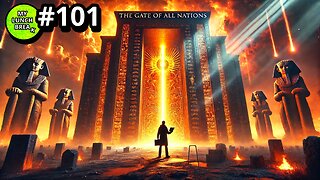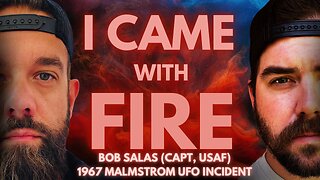Premium Only Content

Jumpstart Nation with Byron and Rhea Mills
1 Corinthians 1 Explained | In-Depth Verse-by-Verse Bible Study Summary
Welcome to this detailed, verse-by-verse teaching of 1 Corinthians 1, where we explore the Apostle Paul’s powerful message to the church in Corinth. Paul’s first letter to the Corinthians is packed with practical lessons on Christian living, church unity, spiritual gifts, and the wisdom of God. In Chapter 1, Paul sets the stage for the entire letter, addressing key issues the Corinthian church was facing, which are still relevant for believers today.
In this expanded summary, we’ll unpack Paul’s message, examining the historical context, breaking down each section of the chapter, and highlighting practical applications for Christians today. Whether you're studying the Bible for the first time or you're a seasoned student of Scripture, this teaching will provide valuable insights into God's Word. Let’s dive into the details of 1 Corinthians 1.
Introduction and Thanksgiving (1 Corinthians 1:1-9)
Paul begins his letter with a warm greeting, affirming his apostolic authority. In verses 1-3, Paul introduces himself as "called to be an apostle of Christ Jesus by the will of God." This opening establishes his authority to address the issues within the Corinthian church. He also includes Sosthenes, a co-worker, to signify the unified message they bring to the church.
Next, in verses 4-9, Paul expresses his gratitude for the Corinthians and acknowledges the spiritual gifts God has bestowed upon them. Despite the issues that Paul will soon address, he begins by highlighting the grace that has been given to them in Christ Jesus. He notes that the Corinthians “have been enriched in every way” and that they “do not lack any spiritual gift as [they] eagerly wait for our Lord Jesus Christ to be revealed.” This is a powerful reminder to the church of their identity in Christ and the blessings they possess, setting a positive tone before addressing the problems.
Dealing with Divisions (1 Corinthians 1:10-17)
In verses 10-17, Paul shifts his focus to the first major issue facing the Corinthian church—divisions and factions. The church was becoming fractured due to allegiances to different leaders. Some claimed to follow Paul, others Apollos, Cephas (Peter), or even Christ. Paul’s response is clear and direct: he appeals for unity among the believers.
Paul urges the Corinthians to "agree with one another" and to be "perfectly united in mind and thought." He emphasizes that Christ is not divided and that no human leader should take precedence over Christ Himself. Paul downplays his own role in their spiritual development, stating that he was sent not to baptize, but to preach the gospel. This is a crucial lesson for modern churches as well, where personal preferences and allegiances to leaders or denominations can sometimes lead to divisions. Paul reminds the church that their focus must remain on Christ and the message of the cross, not on human personalities.
The Message of the Cross and God’s Wisdom (1 Corinthians 1:18-31)
The second half of the chapter (verses 18-31) provides one of the most profound teachings on the wisdom of God compared to the wisdom of the world. Paul contrasts the world’s view of wisdom with God’s wisdom, which is most clearly demonstrated through the message of the cross.
In verse 18, Paul states, "For the message of the cross is foolishness to those who are perishing, but to us who are being saved it is the power of God." This is a key theme throughout the letter. To the world, the idea of a crucified Savior seems absurd and weak. However, to those who believe, the cross represents the ultimate expression of God’s power and love. This teaching is timeless and deeply relevant for Christians today who live in a culture that often devalues faith and exalts human knowledge.
Paul continues to drive home the point in verses 19-25, where he quotes Isaiah, reminding the Corinthians that God will "destroy the wisdom of the wise" and that human wisdom cannot compare to God’s. He asks a rhetorical question: "Where is the wise person? Where is the teacher of the law? Where is the philosopher of this age?" Through these questions, Paul emphasizes that human wisdom is futile when it comes to understanding God’s plan for salvation.
In verses 26-31, Paul reminds the Corinthians of their own humble backgrounds. Most of them were not wise, influential, or noble by human standards. Yet God chose them to be part of His kingdom. Paul explains that God intentionally uses what seems weak or foolish to shame the wise and strong. This way, no one can boast before God. The only boast they can make is in Christ and His work on the cross.
Applications for Today
The teachings in 1 Corinthians 1 are incredibly relevant for modern-day believers and churches. Here are a few key takeaways:
Church Unity: One of the central themes of this chapter is unity within the body of Christ. In today’s world, churches can often become divided over leadership styles, worship preferences, or theological differences. Paul’s exhortation to the Corinthians reminds us that Christ is the foundation, and we must stay focused on Him rather than on human leaders or personal preferences.
The Power of the Cross: The message of the cross may still seem like foolishness to the world, but it remains the central truth of Christianity. As believers, we must embrace the countercultural nature of the gospel and be bold in proclaiming that the power of God is revealed in what the world sees as weakness—Jesus’ death on the cross.
God’s Wisdom vs. Human Wisdom: In a world that highly values knowledge, intellect, and human achievement, Paul’s teaching reminds us that God’s wisdom often goes against the grain of worldly wisdom. True wisdom is found in Christ and His work, not in human intellect or status. This challenges us to re-evaluate where we place our trust and what we consider valuable.
Humility and God’s Grace: Paul’s reminder that God chooses the lowly and weak should lead us to humility. No one can boast in their own abilities or wisdom; it is only by God’s grace that we are saved and called into His service. This truth should humble us and inspire gratitude for the grace we’ve received in Christ.
Conclusion
In this verse-by-verse study of 1 Corinthians 1, we’ve uncovered essential truths about church unity, the message of the cross, and the difference between human and divine wisdom. Paul’s letter to the Corinthians, written thousands of years ago, still speaks directly to the heart of the issues we face in the modern church. By focusing on Christ and His message, we can overcome divisions, embrace God’s wisdom, and live lives that glorify Him.
Whether you’re looking to deepen your understanding of 1 Corinthians or seeking practical applications for your Christian walk, this chapter provides timeless insights that are still relevant today.
Be sure to explore the entire series to continue learning from this incredible letter to the Corinthians!
Website: https://byronmillsministries.com
Substack: https://byronmills.substack.com
Facebook: https://www.facebook.com/byronmillsministries
Youtube: https://www.youtube.com/@byronmills
Twitter: https://www.twitter.com/byronzmills
-
 39:58
39:58
Jumpstart Nation
10 days agoTONGUES: Unleashing The Pent Up TORRENT
70 -
 22:01
22:01
DeVory Darkins
1 day ago $34.71 earnedHakeem Jeffries SHUTS DOWN The View as Matt Gaetz Speaks out
73.5K121 -
 2:02:54
2:02:54
Mally_Mouse
12 hours agoLet's Play!! - Spicy Saturday
54.1K2 -
 1:33:06
1:33:06
Slightly Offensive
13 hours ago $29.10 earnedAre You Ready for What's Coming Next? | Just Chatting Chill Stream
71.9K40 -
 32:10
32:10
MYLUNCHBREAK CHANNEL PAGE
1 day agoThe Gate of All Nations
144K63 -
 13:07
13:07
Sideserf Cake Studio
17 hours ago $3.77 earnedIS THIS THE MOST REALISTIC SUSHI CAKE EVER MADE?
61.4K4 -
 21:08
21:08
Clownfish TV
1 day agoElon Musk Tells WotC to BURN IN HELL for Erasing Gary Gygax from DnD!
49.3K16 -
 48:22
48:22
PMG
13 hours ago $11.03 earned"IRS Whistleblowers Speak Out on Biden Family with Mel K In-Studio"
39.9K25 -
 2:59
2:59
BIG NEM
14 hours agoLost in the Wrong Hood: Who Do I Check In With?
30.4K2 -
 1:29:32
1:29:32
I_Came_With_Fire_Podcast
1 day ago"UFOs, Nukes, & Secrecy: Bob Salas on the 1967 Malmstrom Incident, UAPs, & Disclosure"
141K29